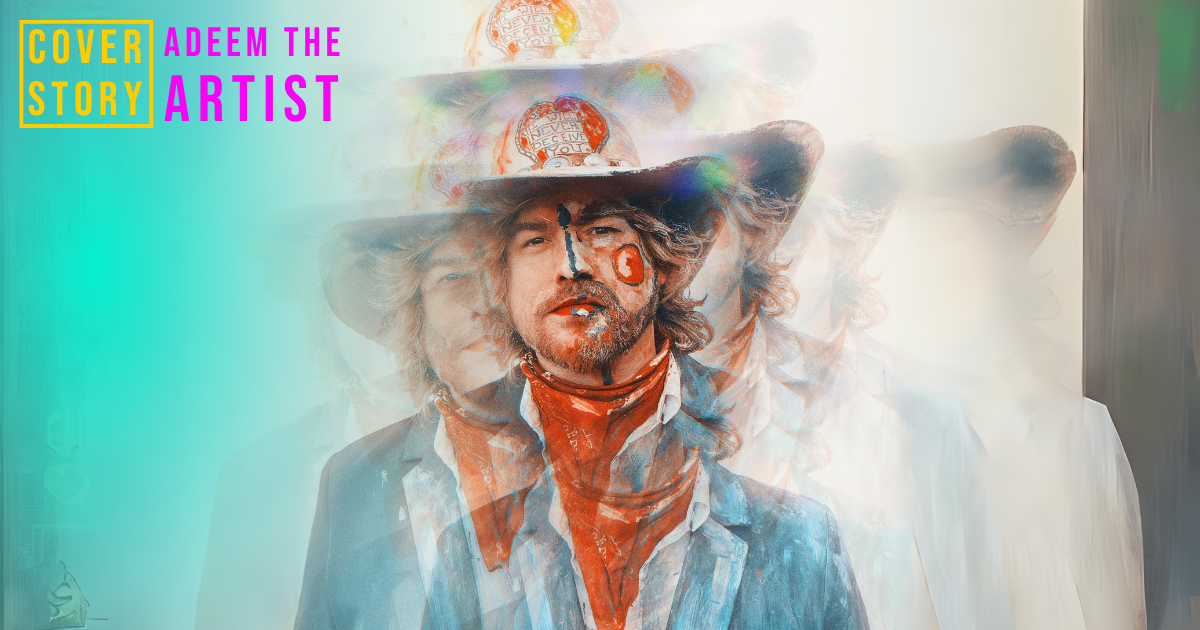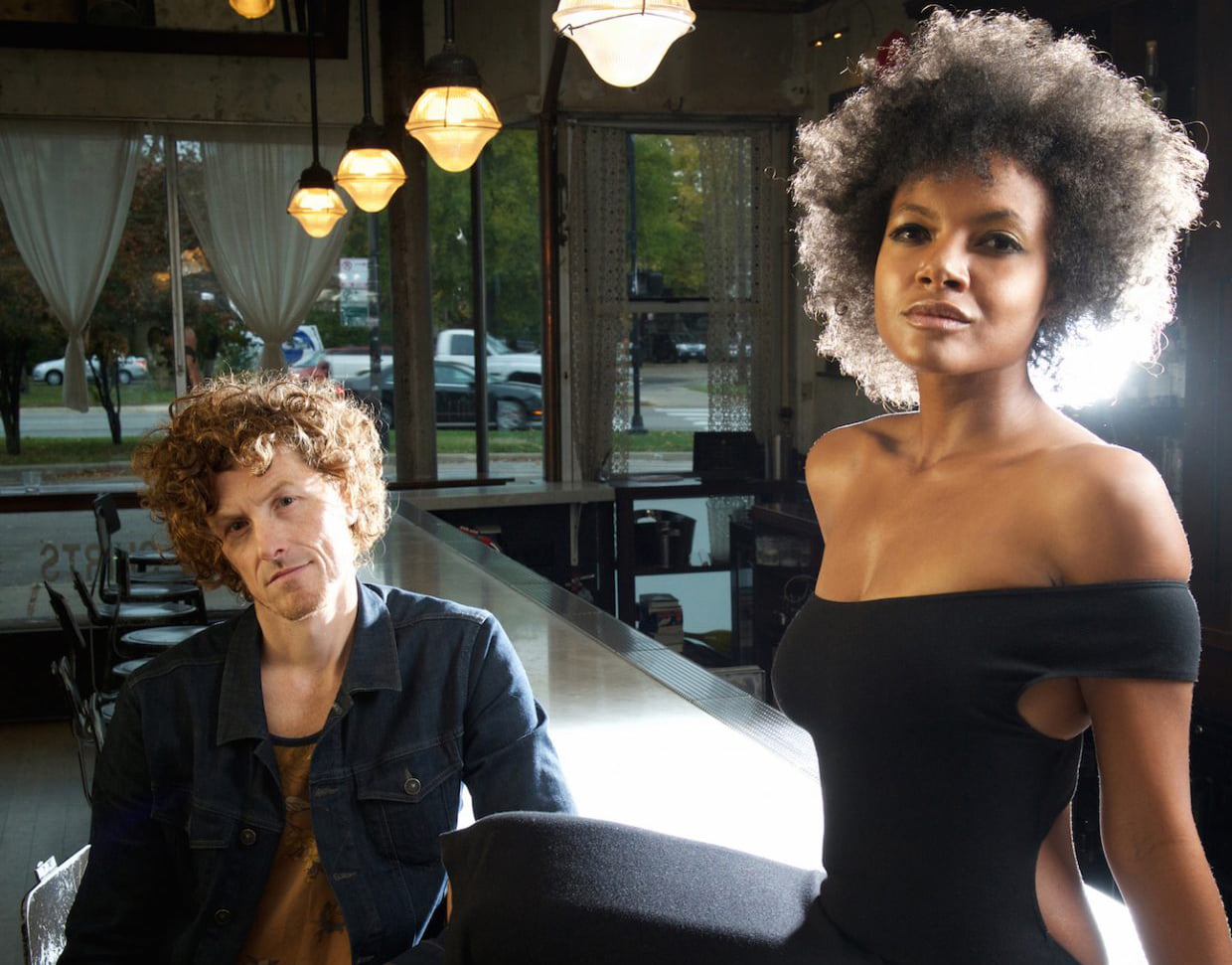In the press release for their 2024 album Anniversary, Adeem the Artist, the non-binary, self-described “cast iron pansexual” singer-songwriter, mentions that the album is queer country – as a genre, not simply as music made by queer people, but as a whole new thing. They also mention recording and creating with their child, their partner, and their tour manager, in a week off from touring in semi-rural Texas. The album is a deeply moving, hauntingly specific, and profoundly sophisticated look at the interweavings of family and a (literally) hostile landscape.
This is queer country – queer as a sexuality and gender and musical identity, but also as an indication of being a little askew, not really fitting plumb, as a political and personal identity. Here, a genre, Adeem notes, is a way of working against expectations or histories:
“Country music is important to me, because it’s so much tied into the dirt of where I grew up. It feels like a place I can comfortably speak from, in the authority of my testimony as a Southerner and a child of Confederates. That’s my responsibility, my calling. That’s why I’m making country records right now. It’s where I need to be, to be processing the things I’m processing.”
One of the ways of keeping safe in this landscape, while acknowledging and trying to make amends, is to move inwards, to lean on the “cast iron” of “cast iron pansexual.” This album moves from the outside – a world that is toxic and violent – toward one that is domestic. In the coruscating rock breakdown of “Plot of Land,” with its minute-long, Tom Petty quoting coda, Adeem sings:
And the politicians cast their lies like street craps,
And they sweep up every time
So baby I’m gonna find us a plot of land
With a little home to put a family in …
The plot of land is a long term plan, but there are moments in this record where you can see possibilities – of a loving home, of a rock and roll life, of a genderqueer Southern utopia, of the perfect dive bar meetup – falling out of an ambitious set of recordings. The too muchness of the album can be understood given it was made in a week, in a hostile place.
Adeem talks about how they made “Nightmare” in Texas, incorporating all the elements in their surroundings including “Isley’s laughter [their daughter], Kyle’s gentle presence [their tour manager], Hannah’s bouncing energy [their wife] as she pitche[d] hymns we could reference irreverently. That week away from the internet and the news cycle was a little insulation bubble that gave us so much room to breathe and feel safe. I don’t think this song could’ve been delivered with a different midwife.”
The midwife analogy is especially relevant to understanding some of these songs, particularly “Carry You Down,” where Adeem writes gorgeously about having and raising babies. The song is so gentle, so respectful of the autonomy of the child, but also filled with the details of domestic life that have become rare in country lately. In an album about adult pleasures and pains, it is a rest song, about carrying a child down the stairs when they ask to be carried, even if that interrupts “chorin’,” doing dishes or work in the garden.
If “Carry You Down” is a waltz, then “The Socialite Blues” is a romp about “staying up to the break of dawn/ making out of tune songs with you” – another kind of domestic, with “out of tune” its own kind of queerness. These songs have a sweetness, a refuge from harm, a way to escape not outside, but within.
The invocation of “out of tune songs” is a euphemism, but there are spaces on the album where Adeem is explicit about desire, as explicit as a country song has ever been, like in “Nancy,” which expresses exactly how difficult it is to fuck while on pharmaceuticals; or “One Night Stand,” about relationships that happen between last call and sunrise, but whose memory might, out of mercy and grace, stay on for “a lifetime of nights with him;” or “Part and Parcel,” where they sing, in gentle but urgent tones:
Take it all apart, it’s part & parcel
I came here with a strange and honest feeling
Chase all of these contradicting versions
Childhood perversions, & dreams that never steered
Let them drive a little while so that I can disappear
Those “contradicting versions” include being a child from the South, so the history here is not only personal, but social and political. There is a cluster of artists working out the history of the South right now – Justin Hiltner’s “1992,” Miko Marks’ Race Records, Willi Carlisle’s recitations of the failures of Appalachian and rural drug work, the entire career of Jake Xerxes Fussell, all of the ancestor work in Beyoncé’s Cowboy Carter. It might seem like Adeem’s work is personal, but all of this historical work flows from the personal to the corporate, an understanding of history that includes both last week and last century, trauma and joy twisting into a complex homecoming.
Homecoming for Adeem also includes the history of Knoxville, Tennessee; on the album’s last song “White Mule, Black Man,” they begin by asking if it’s too much to do one more, but after the end of the track, it’s clear that nothing could be more proper. Here, Adeem telling stories of the South, from Confederation onward, means taking racial politics seriously.
In almost exactly three minutes, they tell the story of a white mob rioting after a foiled lynching, the eventual coverup of that lynching, and the layers of myth-making and storytelling to prevent the truth from being revealed. Moving from talking to singing, somewhere between Peggy Lee’s “Is That All There Is” and Dylan’s “The Lonesome Death of Hattie Carroll,” the story in this final song laments, “But if the Tennessee River runs red with blood/ ‘Til the city runs white again/ Well, a white mule’s curse means more round here/ Than the last words muttered by murdered Black men.”
Adeem has been blunt like this before, tearing down the charnel houses of violent American racism and its myths, and this song is a deepening and extending of that practice. By ending the album on this note of violence, not as a lecture but as a moral accounting, that history work is ensuring that everyone is seen and known, their family is known, and the origins of their family’s prosperity is known.
Such knowledge is the necessary, sometimes haunting, sometimes delightful, attraction of Adeem as a person and “the Artist” – earning that sobriquet.
Photo Credit: Hannah Bingham



